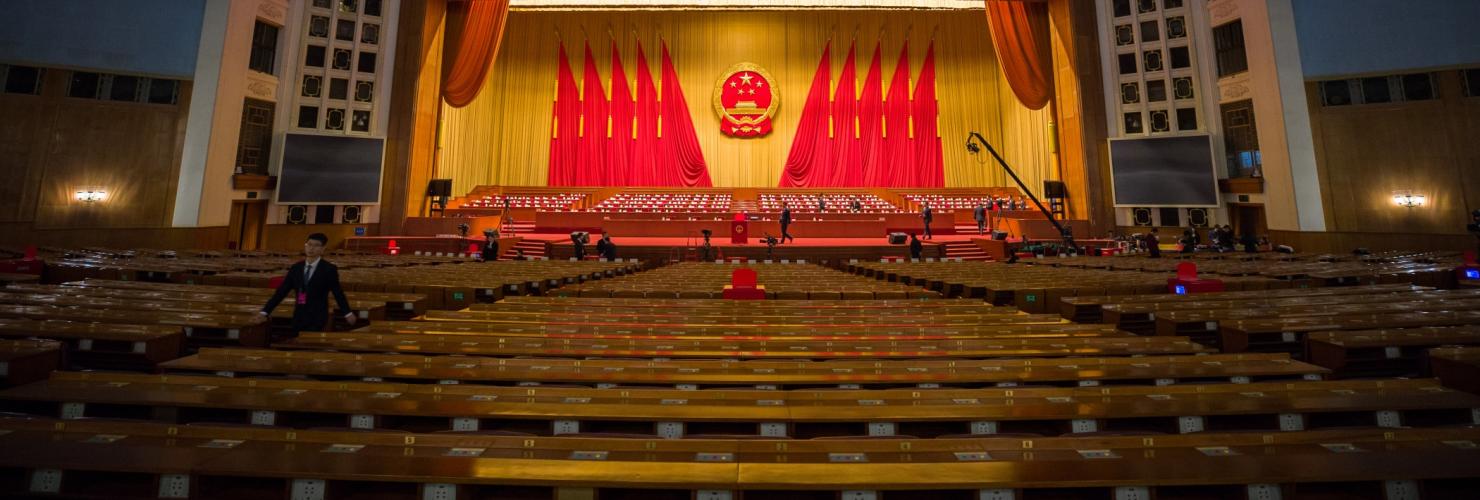

In Xi’s China, the center takes control of foreign affairs
The establishment of the Central Foreign Affairs Commission appears to strengthen the role of the CCP in China’s foreign policymaking. The new body will likely have a higher standing than the former Leading Small Group on Foreign Affairs and further sideline the government agencies in charge of foreign policy. This article is part 2 of a MERICS blog series on China’s new foreign policy setup.
In overhauling China’s foreign policy, party and state leader Xi Jinping started at the top. On March 21, 2018, during this year’s National People’s Congress, Beijing announced a major reshuffle of government and party institutions. As part of this reform, four leading small groups, including the Foreign Affairs LSG, were upgraded to Commissions.
The Central Foreign Affairs Commission replaces the former Central Leading Small Group on Foreign Affairs as the central institution in charge of coordinating China’s foreign policy. As with the other three commissions, the goal of this change is to strengthen the authority of the Communist Party and improve policy coordination across departments. While the precise difference between a LSG and a commission is unclear, commissions are most likely higher-ranking, more formalized bodies with more bureaucratic power to guide policy.
Since they were first introduced in the 1950s, the task of Leading Small Groups (LSGs) has been to advise the Party on policies and to coordinate their implementation among all the relevant ministries and departments. The Foreign Affairs LSG, one of the most important among all the groups, was set up in the last shape it took in 1981 and its goal – like that of other LSGs – was to coordinate China’s often disjointed foreign policy.
Due to their high-level membership, LSGs are informal in nature and only meet a few times a year at best. Their effectiveness depends on their general offices, which are permanently staffed, have office space and a budget. The general offices tend to operate through the general offices of ministries or departments. For example, as Alice Miller shows, the general office of the LSG for Comprehensively Deepening Reform is part of the Central Committee Policy Research Office, led by Wang Huning.
Foreign Affairs LSG was seen as ineffective
The Foreign Affairs LSG’s general office, which was likely located inside the Ministry of Foreign Affairs, was reportedly often bypassed by some government agencies because it was seen as low-ranking and ineffective. The group therefore seems to have been incapable of coordinating China’s foreign policy, possibly prompting the upgrade to a Commission. The symbolic value of the upgrade to a commission will most likely improve the group’s standing within the system and signal that disjointed efforts will no longer be tolerated.
Information about the group is sparse, however, and there are no historical parallels to draw upon. Observers are likely to lack detailed information regarding possible changes in the functioning, staffing, membership or budget. The new commission held its first meeting on May 15, 2018, when Xi Jinping was revealed as its head. During the meeting, Xi called for enhancing the party’s centralized and unified leadership over foreign affairs and he pledged to continue promoting the Belt and Road Initiative (BRI).
Official media reports also mentioned that Premier Li Keqiang as deputy head of the Commission and former Minister of Foreign Affairs Yang Jiechi as its director of the general office. Wang Qishan was also identified as a member of the commission. However, it is unclear to what extent this is a major change in terms of membership and ranking, or whether these officials were also members of the Foreign Affairs LSG.
This upgrade will further tighten the Party’s control over China’s foreign policy, as presumably all foreign policy decisions will now have to be made or approved by the commission. This will further reduce the limited leeway that ministries had in the past to implement their own initiatives and make their own policy decisions. This recentralization of power could make the foreign policy-making process in China even more inefficient by adding additional layers of bureaucracy.
Commission could lead to more coordinated policy-making
Furthermore, the Foreign Affairs Commission is likely to remain an opaque, behind-the-scenes body, out of reach for policymakers in Europe and elsewhere. EU governments will therefore continue to have to deal with many Chinese diplomats and government representatives who most likely lack the authority to make decisions on most issues and will only be able to relay their perspectives to decision-makers in the commission.
A more coordinated foreign policy, however, may also have upsides for China as well as for its diplomatic counterparts. Having the commission lead policy-making and implementation from the top could lead to clearer messaging from the various Chinese government and party departments. A greater authority of the commission inside the Chinese system of governance might also lead to more consistent implementation.
For policymakers dealing with China, including in Europe, this may not be the worst outcome as it would eliminate conflicting messages. In the past China’s Ministry of Foreign Affairs (MFA) was often undercut by “higher authorities.” The streamlining now sends a clear message that the party alone controls China’s foreign affairs – and that it will not tolerate policies or actions that could jeopardize China’s efforts to become a global power by 2049.
Continue reading part 3 of the blog series.
This series is also published by our partner publication The Diplomat.

